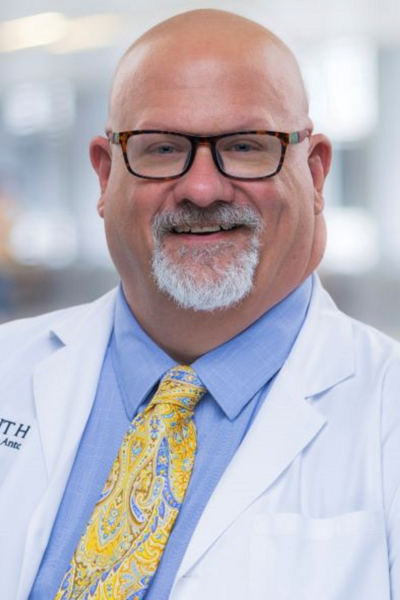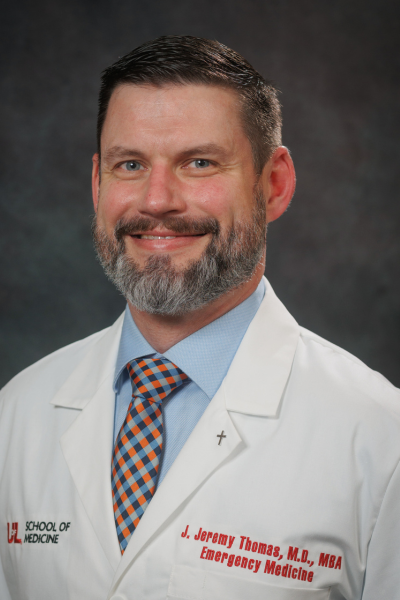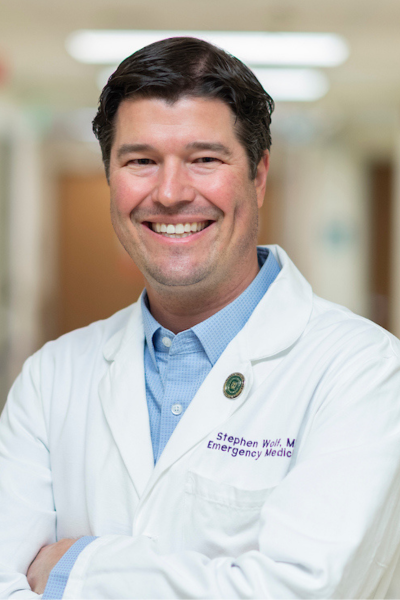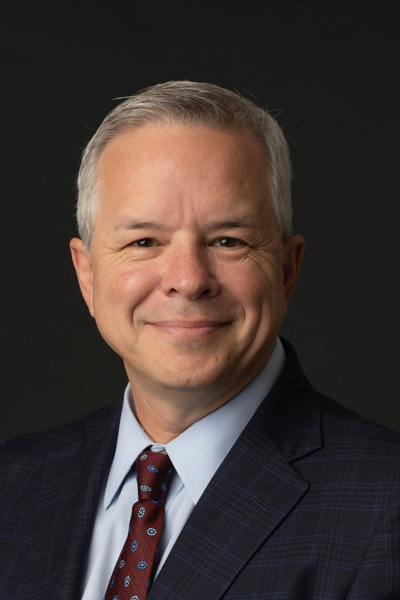AACEM Executive Committee Candidate Statements
Members-at-Large Candidate(s)
-
 Andra L. Blomkalns, MD, MBA
Andra L. Blomkalns, MD, MBAMember-at-Large
Stanford University School of Medicine
Dear colleagues and members of the academic Emergency Medicine community,
I am honored to submit my candidacy for a role on the AACEM Executive Team to represent you and my colleagues in academic Emergency Medicine. I have a deep commitment to advancing our discipline and a proven track record of organizational leadership and advocacy for emergency medicine research and education. I am well-suited to serve in a capacity that will drive our specialty and academic mission into a new era.
My experience in academic Emergency Medicine is extensive, having previously served as the President of the Society for Academic Emergency Medicine (SAEM), serving on the SAEM Board for seven years, serving as Chair of the SAEM Program Committee for the annual meeting for the last time we all went to Phoenix (2010) and Boston (2011). During my relatively brief 5.5 years as Chair at Stanford, I’ve experienced the challenges of building a young department to gain respect within the institution and actively participate in its academic mission. I am deeply committed to recognizing the academic excellence that our field deserves.
Look around us. Emergency Medicine stands at a unique crossroads with significant challenges. Roughly 50 years ago, our specialty was born and fought to be represented as Departments over divisions. Yet, half a century later, many of us still have the same conversations year after year regarding crowding, boarding, length of stay, and leaving without being seen. The corporatization of medicine ravages our autonomy and insults our intellect. I challenge any of you to find “creating new knowledge of how to save lives and educating the next, most capable emergency physicians” on a corporate board meeting agenda.
Half a century ago, we staked a claim with board certification, expertise in the emergent airway, point-of-care ultrasound, critical care, social emergency medicine, emergency medical services, global emergency medicine, and more. Diversity, Equity, Inclusion? No other specialty cares more about the systemic inequities in our healthcare system. We continue progressing with sustainability, digital health, climate change and health, palliative care, pain medicine, data science, artificial intelligence, machine learning, and more.
Moreover, Emergency Medicine should not be seen just as a field to train for a minimum of three years to meet the challenges of student loans and enjoy a part-time medicine profession lifestyle. Emergency Medicine is a calling, a dedication to advancing the science and practice of emergency care. Saving lives! As the clinician- and physician-scientist become even more of an endangered species in Emergency Medicine, we are on the sidelines watching the diversion of students away from Emergency Medicine pipelines/pathways because of continued academic reputational challenges. Perhaps, during the period of our semi-centennial, can we come together for a refreshed strategy?
I am optimistic that Emergency Medicine can continue to emerge as a leader within the broader house of clinical and academic medicine. Many AACEM’s emeriti have ascended to leadership positions throughout healthcare, government, and industry. Our specialty holds a distinctive position as no other medical discipline is as adept at mastering the dialectical exchange of patients within the entire healthcare system.
However, our path forward is fraught with challenges. Academic medicine is under immense stress, with securing federal funding becoming increasingly difficult. We find ourselves in a time of crisis reminiscent of the inception of our discipline. Critical issues, such as academic integrity, funding, space, innovation, regulation, and assaults on leadership, threaten the very foundation of academic medicine. We must address the pathways and pipelines in undergraduate and medical school education to ensure the sustainability of academicians in our profession.
In conclusion, I am excited to serve you and academic Emergency Medicine, drawing upon my past experiences and commitment to transformation. Together, we can navigate the challenges ahead, champion the values and integrity of our discipline, and ensure a vibrant and diverse future for academic Emergency Medicine.
Thank you for your consideration.
-
 Ralph Riviello, MD, MS
Ralph Riviello, MD, MSMember-at-Large
UT Health San Antonio
I have had over 26 years of academic emergency medicine experience. After graduating from Hahnemann University SOM, I completed my EM residency at Allegheny General Hospital in 1997 and served as Chief Resident in my final year of residency. I received a Master's Degree in Clinical Forensic Medicine in 2006, and have applied that experience in building my academic niche. During my career, I have held various roles in several spheres including, Director of Clinical Research, Associate Program Director, Vice Chair of Clinical Operations, and now Chair of Emergency Medicine. My experience as Chair as been in both the community academic and university settings. I am currently the Chair of EM at UT Health San Antonio. I have been a long-standing member of SAEM and AACEM. I currently serve on the AACEM Leader Development Workgroup and DEI Workgroup. I did complete the Chair Development Program and found it invaluable in the transition to Chair, and feel it is one of the most important aspects of what AACEM does. Though I have not served in an SAEM leadership role, I am Past-President and former board member of the Pennsylvania ACEP chapter, and have been a ACEP Section Leader. I am running for office as I feel that giving back to our organizations and my colleagues is an important role. I have benefited from the mentorship, wisdom, and counsel of many past and current members of this organization, that I feel it is my time to pay it forward and help shape the future of the organization. I hope to continue the good work AACEM has done and to move us even further. For me, priorities include increasing DEI across the specialty, especially in the face of hostile state environments and enhancing leader development through the CDP and our newest, eLEAD program. Creating, building, and sustaining a leader pipeline is so crucial for our organization and specialty, that is why I feel the eLEAD program is so important for the continued success of EM. As Chairs, with our various experiences and backgrounds, I think we are crucial in analyzing and responding to what happened in the last match and developing a comprehensive plan, with our other EM organizations, to analyze it, temporize it, and prevent it from ever happening again. Also, with the many other threats to and attacks on Academic EM, I feel the organization needs to be nimble and facile at responding to them, and arming chairs with the tools to help advance their departments at their own institutions. Additionally, my experience on community-based, Board of Directors, and leadership roles in these agencies will provide me a unique perspective in serving in this role.
-
 Rahul Sharma, MD, MBA
Rahul Sharma, MD, MBAMember-at-Large
New York-Presbyterian Weill Cornell Medical Center
I serve as the Barbara and Stephen Friedman Endowed Professor and Chair of the Department of Emergency Medicine at New York Presbyterian-Weill Cornell Medicine. I oversee the operational and administrative activities of four NYP-Weill Cornell EDs (Brooklyn, Queens, Weill Cornell, Lower Manhattan), which see approximately 400,000 patient visits per year and which host three separate ACGME EM Residency programs. I also serve as the Founder and Executive Director of the Center for Virtual Care at Weill Cornell Medicine, Chief of EMS for the NYP Enterprise, Chair of the Finance Committee for the Weill Cornell Medicine Physician Organization and serve on the Board of Fellows for Weill Cornell Medicine. Additionally, I was the past president of the New York Presbyterian Hospital Medical Board. Prior to becoming Chair, I was Chief of the Division of Emergency Medicine at Weill Cornell Medical College and led its promotion to full departmental status in 2018. I have been a longstanding member of SAEM and have actively participated in AACEM since becoming Chief in 2016. Most recently, I served as a member of the AACEM Leader Development Workgroup where I contributed to the development of the Emerging Leader Development program (eLEAD) offered by AACEM. I have received two national teaching awards from ACEP and EMRA, the Modern Healthcare Top 25 Innovator in the Healthcare Industry Award, and the ACEP National Innovative Change in Practice Management Award. I am also an elected life member of the Council on Foreign Relations (CFR).
My academic and research interests focus on the development and use of technological innovation to improve the quality of emergency care and its delivery. Accordingly, I have launched several ED based digital health platforms that transformed healthcare delivery, especially during the COVID-19 pandemic. I believe we can advance our specialty by becoming leaders in providing emergency care outside of the hospital environment by utilizing technology, including telemedicine, remote patient monitoring and artificial intelligence. Emergency Medicine providers are uniquely positioned to do this and to also advance the research and education opportunities within this care delivery model. I also founded the Center for Virtual Care at Weill Cornell Medicine in 2019. The mission of the Center is to transform healthcare delivery through telemedicine, with a focus on patient quality and outcomes. It provides robust training and simulation to all clinicians active in the virtual care space, including all GME trainees across the New York Presbyterian Hospital enterprise and other hospital systems. I also developed our annual Virtual Healthcare Conference and Research Forum, one of the first telemedicine research forums established in the nation.
I believe wellness is a priority, particularly in light of the challenges faced by our specialty. Our physician led wellness program has been recognized nationally, including at the National Academy of Medicine and, most recently, at the 2023 SAEM Annual Meeting. I also co-chair the Weill Cornell Medicine Physician Organization Physician Wellness Workgroup which is tasked with providing impactful recommendations to senior leadership at our institution. Our Diversity, Equity and Inclusion efforts have had similar success with investment in opportunities for faculty, residents and students and the establishment of our diversifiED committee. Furthermore, we have devoted a significant part of our research in both global health and telemedicine to the study of health disparities that plague women and underrepresented groups. I would hope to build on the significant progress AACEM has achieved in the areas of wellness and DEI.
My work with AACEM and my interactions with my Chair colleagues have been instrumental in my growth as a chair. It is an invaluable resource and network which provides countless opportunities to collaborate with my chair colleagues, participate in national dialogues, and offer and engage in mentorship. It has also helped me to further realize my goals in education and research.
It would be an honor to serve on the AACEM Executive Committee and I believe, if given the opportunity, I would make immediate and meaningful contributions to this esteemed group. I would enthusiastically bring my experience and expertise in academic Emergency Medicine to AACEM and, if elected, I will support and work with other members of the Executive Committee and the organization to launch initiatives focused on the recruitment, development, and retention of faculty, residents and medical students. I will also work to strengthen our national network and to develop a pipeline of future emergency care researchers and academic and clinical faculty.
-
 J. Jeremy Thomas, MD, MBA
J. Jeremy Thomas, MD, MBAMember-at-Large
University of Louisville
My educational background includes a BS in Biology from Cumberland College, MD from the University of South Alabama. Internship in Internal Medicine at the University of South Alabama. Residency in Emergency Medicine at University of Alabama at Birmingham (UAB). Fellowship in Cardiovascular Emergencies at the University of Virginia. And my Physicians Executive Master’s Degree in Business Administration (PEMBA) from Auburn University.
My career qualifications include 13 years on Core Faculty at UAB Dept. of Emergency Medicine with multiple leadership roles during my time there, including Associate Residency Director, Director of Observation Medicine, System Emergency Department Medical Director, Executive Vice chair of Emergency Medicine and Associate CMO over Sepsis and Emergency Services for the health system. In January of 2020, I joined the University of Louisville Department of Emergency Medicine as Endowed Chair and Chief of Service for Emergency Medicine. In this role, I also serve of the Board of Directors for the University Hospital and the Board of Directors for UofL Physician practice, in addition to multiple other committees across the school of medicine and the health system.
I have been an active member of SAEM for much of my career. My most recent activity is in the AACEM committees (community 2020-22, and DEI – 2022-Present).
I am interested in joining the Executive Committee for AACEM because in my 4 years as chair, I have seen the impact that AACEM can have on the training and the practice of Emergency Medicine nationally and internationally. The focus on the training programs in EM and the quality of our residency programs, the wellbeing of our physicians and residents, and the sustainability of the practice of emergency medicine are at the heart of this group and are the parts of my career that I am most passionate about.
If elected, one of my focuses would be to increase collaboration and connectivity between the academic chairs of EM. The chair position can be a lonely job, but I would like to look at setting up small regional groups of academic chairs that would be interested in meeting (virtual or in person) quarterly or more frequently, to discuss issues in more detail that just the list serve emails, to share resources and build stronger relationships. I also hope to learn from the tremendous leaders in EM that are already serving on the Executive Committee, so that I can hopefully adequately fill their shoes in the future. -
 Stephen J. Wolf, MD
Stephen J. Wolf, MDMember-at-Large
Denver Health Medical Center
It would be an honor to represent you as a Member-at-Large on the AACEM Board of Directors. For the past 5 years, I have served as Director of Service for Emergency Medicine at Denver Health while being significantly involved in our Academy. Currently, I have the honor of co-directing our SAEM/AACEM Emerging Leaders Development (eLEAD) Program and leading our AACEM Leadership Development Working Group.
My background is one that prioritizes service and commitment to our patients, learners, providers, and specialty. I am passionate about developing and aligning effective individuals, teams, and communities, to multiply their impact and achieve outcomes. Each of my past and current roles have helped me to develop my own skills to this end. In addition to those mentioned above, I have served locally as a Program Director, Director of Education, Assistant then Associate Dean of UME, Vice Chair of Academic Affairs, and an appointed member on our hospital board’s finance and academic committees. Nationally, I have served as an ACEP state chapter president, chair of CORD’s Academy for Scholarship, and Chair of ACEP’s Clinical Policy Committee. Additionally, I continue to serve as an ABEM oral certification examiner and a member of ABEM’s Key Advanced Practice Committee.
As each of you know, AACEM is a remarkable community with profound commitment to supporting and developing, not only our academic departments, but also our specialty as a whole. We are unique in the power of our voice; AND we must use that voice to have influence and impact in the areas that matter most to our learners, faculty, and departments, particularly as they shape the future of Emergency Medicine. Our learners must feel drawn to an inclusive and vibrant specialty; our faculty must have wellness, safety, and developmental opportunities; and our departments must be equipped with the resources needed to address challenges and have significant impact both within our institutions and communities.
If elected, I would apply my passion and skills to continue the incredible work our Academy has been doing to date, with particular focus on strengthening our internal developmental opportunities and amplifying our external impact, using our collective influence. I see these two areas as closely related as growing our members will strengthen our voice.
Again, it would be an honor to serve our Academy in the role of Member-at-Large on the BOD. -
 David Wright, MD
David Wright, MDMember-at-Large
Emory University School of Medicine
Dr. Wright, a tenured Professor and Chair of the Department of Emergency Medicine at Emory University School of Medicine, boasts a distinguished career that intertwines education, innovation, and clinical excellence. As the director of both the Center for Innovation and Discovery in the Acute and Emergent Sciences (IDEAS) and the Emergency Neurosciences Clinical Laboratory, Dr. Wright's expertise is at the forefront of acute neurological conditions research. His leadership in significant clinical trials, such as ProTECT III, and his role in networks like SIREN and Georgia StrokeNet, highlight his substantial clinical trial experience. He also brings inventive prowess, with patents to his name, and collaborative skills through adjunct faculty roles across prestigious institutions like the Georgia Institute of Technology.
With over three decades of involvement in the Society for Academic Emergency Medicine (SAEM), Dr. Wright has contributed extensively to various committees and editorial boards, underscoring his dedication to the field. His candidacy for the SAEM Foundation Board of Trustees is driven by a desire to leverage his extensive network, fundraising capabilities, and a fervent belief in the vital role of academic emergency medicine. Dr. Wright seeks to guide and support the next generation of emergency medicine professionals, aiming to enhance innovation, education, and patient care within the discipline.
